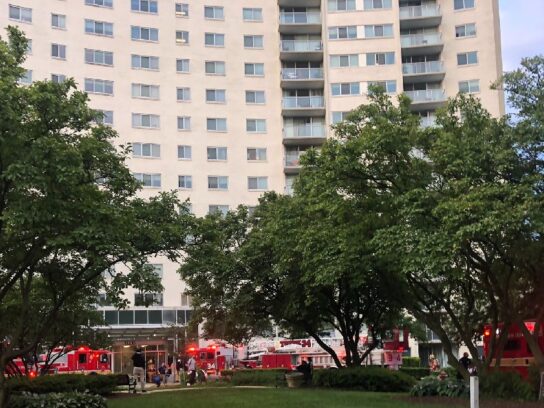
At least 76 tenants at the Enclave Apartments in White Oak – many of whom are Afghan refugees who worked with the United States – face eviction after falling behind in their rent payments.
According to Ilhan Cagri, spokesperson for a Muslim Community Center working group, many of the Afghanis were resettled at the Enclave on New Hampshire Avenue and were told resettlement agencies would help them start their lives in America.
That financial assistance ended a while ago, and so did federal rental assistance funds that were allocated during the pandemic, according to Councilmember Kristin Mink, who is working to stave off the evictions.
The families don’t speak English very well and are not always knowledgeable as to where to turn for help, Cagri and Mink noted.
According to Cagri, many of the rents were between $1,600 and $1,800 a month when the Afghanis were resettled at the Enclave. Since the relief ended, some rents have jumped to between $2,600 and $2,800.
Now, many face eviction. Whole families with many children will be put on the street with nowhere to go, said Cagri, who along with others from the Muslim Community Center, spent Sept. 14 speaking with many of the tenants who face eviction.
The volunteers connected with 76 people who have a judgement against them for failure to pay their rent. Another 23 tenants are in danger of eviction and have received information from the courts, and three could be out on the streets any day now, Cagri said.
Mink explained that many of the Afghan tenants are Special Immigration Visa holders, which are given to Afghan nationals who worked for or on behalf of the U.S. government or for the International Security Assistance Force in Afghanistan.
It is difficult to calculate the exact number of people facing eviction as the total changes constantly when people move out or pay some of their back debt, Mink said. Landlords do not have to share that number with the county, she noted.
She estimated that 90 Enclave tenants face eviction, not all of whom are from Afghanistan.
“The basic situation is that people just do not have enough money to pay their bills, and we don’t have enough affordable housing,” Mink said. Also, she noted, area shelters are full.
Last year, the federal government allocated $14 million to the county for rental assistance. This year, that amount dropped all the way to zero, she said.
Mink has reached out to state and federal officials for help, including MORA – Maryland Office of Refugees and Asylees as well as Gov. Wes Moore. Not only do these tenants need financial help, they need help assisting filling out forms and finding jobs or better paying jobs, Mink said.
They are willing to work, she said, “These are all families that want to support themselves.”
The goal “is to prevent this wave of evictions,” she said. “We want to get them help before the sheriff arrives.”
Evictions in the county “have skyrocketed,” Mink said. “It’s not just the Enclave.” She estimated that two years ago, the number of people facing eviction “rarely cracked 400.” Now, she said, the number was 601 in July and 602 in August.
Of that number, typically about 25% end up actually being evicted, she added.
According to Robert Lehman, Montgomery County Chief Deputy in the sheriff’s office, eviction is a lengthy process that begins when a tenant receives a late rent notice. The next step is when the tenant is summoned to court.
Lehman said he didn’t not believe the number of evictions is rising, adding, “It is an extremely low number, but higher than we would like.”
Related Post


Comments are closed.